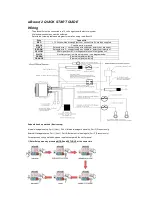
.
2) Setting obS
(Over boost shutdown):
Turbosmart recommends that this function is used in
conjunction with another form of Over-boost protection such as fuel/ignition cut or over-boost valve. The over-boost
function will not stop an over-boost scenario if there is a mechanical failure on the car that inhibits the e-Boost from
controlling the wastegate or if electromagnetic interference due to incorrect wiring causes electrical interference to
the e-Boost. If the
obS
is triggered the e-Boost2 begins to reduce the boost pressure to half of that set in the
obS
parameter. Once this safe pressure is achieved the e-Boost will return to normal operation.
obS
must be set to a
level at least 2.2psi (0.15 bar or 15kPa) above the highest boost pressure. When the
obS
is triggered
obS
will flash
on the display to indicate that your boost pressure has reached the over boost shut down value.
obS
will continue to
flash on the display until the pressure has been reduced to half that set in
obS
and the unit has returned to normal
operation.
obS
will flash on the screen when triggered in live mode and when a set point is being edited under boost
pressure but not inside the boost or setup menus until they are exited.
The
obS
is factory set to 7 psi (0.48 bar or 48 kPa), so you must enter a figure in order for the e-Boost to produce
more than a standard boost pressure. The purpose of this feature is to protect your engine against accidentally
entering a boost set point value that is too high, preventing a dangerously high boost pressure. Extreme care should
be taken when setting this parameter. Turbosmart recommends that you seek advice from an appropriately qualified
technician with regard to the
obS
setting.
Press
MODE
to enter the menu and adjust the values using the
UP
and
DOWN
keys. Press
MODE
again to save the
desired setting.
3) Setting nSP
(Number of set points):
The e-Boost2 is capable of controlling up to 6 individual
boost groups. Setting nSP to a value from 1-6 will then enable that number of boost groups (and their associated set
point, gate pressure and sensitivity) in the boost menu and live mode. Press
MODE
to enter the menu and adjust the
values using the
UP
and
DOWN
keys. Press
MODE
again to save the desired setting.
4) Setting CYL
(Number of Cylinders):
If you have connected the yellow RPM wire to an RPM
signal from your ECU or negative terminal of an ignition coil you will need to input the number of cylinders / rotors in
order to configure the RPM signal correctly i.e. the number of pulses per revolution being picked up from the RPM
output of the ECU. The number of cylinders available is between 1 and 16. The RPM input can accept a square wave
signal between 3.5 and 12V. Twin rotor and triple rotor engines can be configured as 4 and 6 cylinders respectively.
Press
MODE
to enter the menu and adjust the values using the
UP
and
DOWN
keys. Press
MODE
again to save the
desired setting.
5) Setting SCL
(Scale):
The e-Boost2 readout can be configured in either bar, psi or kPa, the default
setting is in psi. This allows you to tailor the readout to suit your own preference. Note that when the psi scale is
selected and the e-Boost2 is under vacuum conditions the display will read in inches of Mercury (inHg) not negative
psi.
Press
MODE
to enter the menu and adjust the values using the
UP
and
DOWN
keys. Press
MODE
again to
save the desired setting.
6) Setting bGr
(Bar graph):
The e-Boost2 bar graph can be configured to indicate a pressure
between zero and full scale (60 psi). The bar graph has ten segments, seven blue segments and three red segments.
When seven segments are illuminated the pressure that has been programmed in this parameter has been reached.
The bar graph is factory set to 15 psi. The desired display pressure can be adjusted to your preference and is
typically set at your maximum boost level. Press
MODE
to enter the menu and adjust the values using the
UP
and
DOWN
keys. Press
MODE
again to save the desired setting.
7) Hold
MODE
to exit the Setup Menu
8) In Live Mode, press MODE and BOOST/DOWN key to enter the boost menu
9) Firstly we will setup
bG1
(Boost group 1). The parameters that can be adjusted in each boost group are set point
(SP#), gate pressure (GP#) and sensitivity (SN#).





















